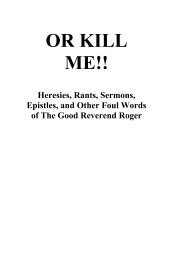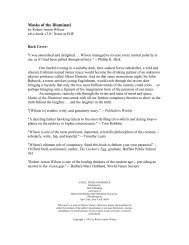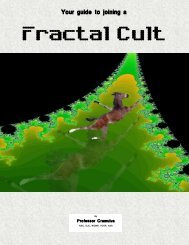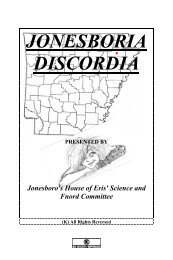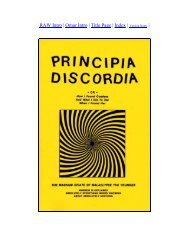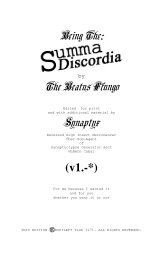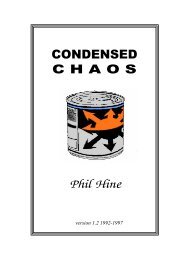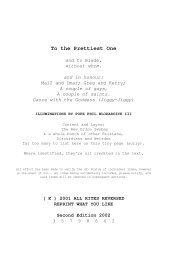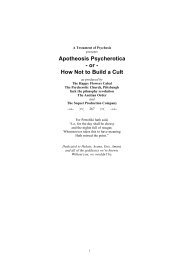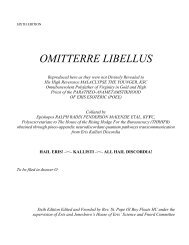Coincidance - Principia Discordia
Coincidance - Principia Discordia
Coincidance - Principia Discordia
Create successful ePaper yourself
Turn your PDF publications into a flip-book with our unique Google optimized e-Paper software.
148 COINCIDANCE<br />
Synchronous events have long fascinated leading scientists.<br />
Are these unexpected occurrences ...<br />
MERE<br />
COINCIDENCE?<br />
For over 100 years, various heretical scientists have been studying the<br />
so-called paranormal—strange events that are attributed to extrasensory<br />
perception, precognition or telekinesis. And, every step of the way, this<br />
research has been attacked by critics who explain the positive results as<br />
"mere coincidence" or (even worse) "sheer coincidence." Now there appears<br />
to be a possibility that coincidence may be more important scientifically—<br />
and may change our scientific paradigm much more radically—than<br />
telepathy would. Coincidence may be more earthshaking than telekinesis.<br />
There have been coincidences so dramatic, so symbolic or so wildly<br />
improbably that they have aroused feelings of the uncanny in scientists and<br />
laymen alike for generations.<br />
Could such things happen by chance alone? There must, it seems to<br />
some, be an underlying logic to these bizarre juxtapositions of events in time<br />
and space. Among those who have seriously considered the logic of<br />
coincidence was Paul Kammerer, the German biologist who was one of the<br />
last of the Lamarckian evolutionists. (Kammerer killed himself soon after<br />
one of his crucial experiments in support of Lamarckian evolution was<br />
found to be a fraud. Einstein, however, was impressed with Kammerer's<br />
work on coincidence, calling it "original and by no means absurd.") Other<br />
interested scientists have included Carl Gustav Jung, disciple of Freud and<br />
one of the great psychologists of the century, who mapped the unconscious<br />
mind with an eye to the mystical; and Wolfgang Pauli, the Nobel laureate<br />
physicist and discoverer of the neutrino who, in the words of Arthur<br />
Koestler in The Roots of Coincidence, extended "the principle of noncausal events<br />
from microphysics (where its legitimacy was recognized) to macrophysics<br />
(where it was not)."<br />
Let us examine a few cases, moving gradually from the only moderately<br />
peculiar to the increasingly bizarre.<br />
1. English novelist Dame Rebecca West was writing a story in which a girl<br />
finds a hedgehog in her garden. As West wrote this passage, she was<br />
interrupted by servants who informed her they had just found a hedgehog<br />
in the garden.



